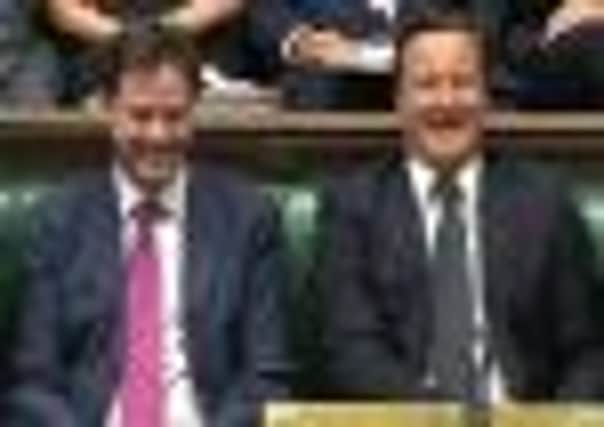Lib Dem claims over Thatcher’s legitimacy spark new vote row


Lib Dem President Tim Farron’s comments, a week ahead of the May 5 referendum on the Alternative Vote, were the latest in a series of increasingly vitriolic attacks directed by the coalition partners at one another.
David Cameron and Nick Clegg shared the Government frontbenches in the Commons yesterday for the first time following an Easter break marked by open hostility between their parties on AV.
Advertisement
Hide AdAdvertisement
Hide AdBut there was little attempt to stage a show of coalition unity, with a stony-faced Mr Clegg shaking his head as the Prime Minister restated his opposition to change, then grinning broadly at Lib Dem jibes over Mr Cameron’s election as Tory leader under a voting system with similarities to AV.
Meanwhile, Labour appears to be split over the issue with the release of a dossier suggesting that more than half of the party’s MPs intend to vote No next Thursday, despite their leader Ed Miliband’s support for AV.
Many Labour opponents of AV – under which voters rank candidates in order of preference and votes are redistributed until one has more than 50 per cent support – wore red badges in the House of Commons to show their support for the current system.
Former Home Secretary David Blunkett said the Labour No campaign had the declared support of 130 of the party’s 255 MPs, as well as tens of thousands of activists.
Advertisement
Hide AdAdvertisement
Hide Ad“The Labour Party doesn’t have a formal position but it’s clear that the overwhelming majority of Labour people up and down the country are saying ‘Vote Labour, vote No to AV’,” said Mr Blunkett.
But another ex-Home Secretary Alan Johnson joined Mr Farron and the leaders of Ukip and the Green Party at a press conference calling for a Yes vote.
Denouncing first-past-the-post as a “miserably disempowering system that belongs in the past”, Mr Johnson said: “Labour should not become part of the establishment view. It is against our history, it is against our principles, it is against our ethos.”
Mr Farron described the Thatcher administration of the 1980s as “a government opposed by the majority, elected by a corrupt electoral system that predates the empire, predates slavery and which, incidentally, helped to sustain both”. The only people with an interest in blocking reform were an MP in a safe seat “who doesn’t want to do any work”, a party leader who wanted to “invade Iraq without a democratic mandate”, or a press baron looking to control information, he said.
Advertisement
Hide AdAdvertisement
Hide AdIn response to Mr Farron’s comments, the No camp pointed to academic studies which suggested Labour would have gained 19 fewer seats in 1983 and 27 fewer in 1987 under AV.
At Prime Minister’s Questions in the Commons, Mr Cameron urged campaigners to “get back to the real arguments about competing electoral systems”. He added: “I am very clear that first past the post is simple, is fair, is effective, has worked for our country.”
Lib Dem MP Ian Swales sparked cheers from AV supporters when he pointed out that Mr Cameron owed his position to a 2005 leadership ballot in which rival David Davis won the first round of voting among Tory MPs before being overhauled in two later rounds.
The Redcar MP said in his opposition to AV, Mr Cameron has shown “special disdain for the idea that someone might win after coming second in an early round” and should therefore stand aside in Mr Davis’s favour.